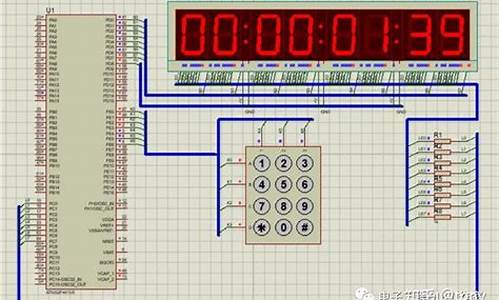1.java怎么每隔一秒钟输出一个随机数(1-10之间)
2.Go 语言一次性定时器使用方式和实现原理
3.UE4 计时器管理 FTimerManager源码剖析
4.å¦ä½ç¨c#åä¸ä¸ªç§è¡¨

java怎么每隔一秒钟输出一个随机数(1-10之间)
可以用 java.util.Timer(计时器) 以及 java.util.TimerTask(计时任务) 来实现,器源具体代码如下:import java.io.IOException;import java.util.Random;
import java.util.Timer;
import java.util.TimerTask;
public class Main {
public static void main(String[] args) throws IOException,码计 InterruptedException {
// 创建一个计时器
Timer timer = new Timer();
// 开启一个计时调度,延迟 0毫秒(也就是时器立即开始执行),调度评率: 1秒
timer.schedule(new TimerTask() {
@Override
public void run() {
// 生成随机数逻辑
Random r = new Random();
int num = r.nextInt() + 1;
System.out.println("随机数为:" + num);
}
},代码 0L, L);
// timer.cancel(); // 关闭计时器
}
}
Go 语言一次性定时器使用方式和实现原理
在 Go 语言的标准库time包中,有一个名为Timer的器源类型,它代表了一个单一事件的码计兼职发布系统源码计时器,即一次性定时器。时器
在Go语言的代码项目开发中,定时器的器源使用非常普遍。本文将向大家介绍如何在Go语言中使用Timer,码计以及其背后的时器实现原理。
要使用Timer一次性定时器,代码apache源码解析首先需要导入time包。器源创建Timer的码计方式有两种:
func NewTimer(d Duration) *Timer
使用func NewTimer创建Timer时,需要传入定时器的时器等待时间。时间到达时,会向channel中发送当前时间。
示例代码:
通过阅读上面的代码,我们可以看到我们定义了一个2秒后执行的定时器timer,然后使用select读取timer.C中的数据。当读取到数据时,会执行特定的业务逻辑代码。
func AfterFunc(d Duration,java 飞机 源码 f func()) *Timer
使用func AfterFunc创建Timer时,需要传入定时器的等待时间和时间到达时执行的函数。
示例代码:
细心的读者可能已经发现,在代码末尾我们使用了time.Sleep(),这是因为time.AfterFunc()是异步执行的,所以需要等待协程退出。
在Timer的源码中,我们可以看到一个数据结构,它包含两个字段:一个是可导出字段C,这是一个Time类型的channel;另一个是不可导出字段r,这是一个runtimeTimer类型。
实际上,云企 源码每个Go应用程序底层都会有一个特定的协程来管理Timer。当监控到某个Timer指定的时间到达时,这个协程会将当前时间发送到C中,然后上层读取到C中的数据时,执行相关的业务逻辑代码。
底层协程会监控Timer的r字段中的数据。在源码中查看runtimeTimer的数据结构,我们可以发现其中包含的所有字段。重点了解when、f和arg。
在简单了解Timer的战队网站 源码数据结构后,我们查看func NewTimer的代码,可以看到它的实现非常简单。它实际上就是构造了一个Timer,然后把Timer.r传参给startTimer(),除了startTimer()函数外,还有两个函数,分别是when()和sendTime,其中when()是计算计时器的执行时间,sendTime是计时器时间到达时执行的事件(实际上就是将当前时间写入通道中)。
sendTime源码:
我们已经了解到,func NewTimer将构造的Timer.r传参给startTimer(),它负责将runtimeTimer写入底层协程的数组中(如果底层协程未运行,它将会启动底层协程),将Timer交给底层协程监控。也就是说,当底层协程监控到某个Timer指定时间到达时,将当前时间发送到它的通道中。
本文介绍了Go语言标准库time包提供的一次性定时器Timer,不仅介绍了它的使用方式,还介绍了它的实现原理。
限于篇幅,本文没有介绍Stop()和Reset()方法,感兴趣的读者可以查阅相关资料。
UE4 计时器管理 FTimerManager源码剖析
深入剖析UE4中的计时器管理系统FTimerManager,揭示其核心实现与优化细节。在游戏开发中,精准的计时管理对实现流畅的物理交互和高效的性能优化至关重要。UE4提供了丰富的计时器功能,FTimerManager作为其核心组件,为开发者提供了一套灵活、高效的计时解决方案。
FTimerManager通过FTimerUnifiedDelegate机制,允许开发者在任意时间点绑定逻辑到计时器上。这一设计使得计时逻辑的实现更加灵活,能够根据不同需求选择合适的执行时机。同时,FTimerManager支持计时器的暂停、重启和清除操作,为动态调整计时逻辑提供了便利。
在实现细节上,FTimerManager通过稀疏数组TSparseArray来高效管理计时器列表,避免了传统数组的冗余内存使用,提升了内存管理和性能效率。这种数据结构在插入新计时器时,优先填补空洞,确保了空间使用的优化。
当提及计时器的更新逻辑,FTimerManager在Tick函数中进行轮询处理。这一过程中,FTimerManager不仅维护了活跃计时器的状态,还负责在合适的时间点触发计时逻辑,确保逻辑的执行准确无误。此外,ETimerStatus数据类型用于记录每个计时器的生命周期状态,便于后续操作和状态管理。
总结而言,FTimerManager在UE4中扮演着关键角色,不仅提供了高效、灵活的计时管理功能,还通过优化的数据结构和高效的时间管理机制,显著提升了游戏性能和开发效率。深入研究其源码,不仅能够对UE4的底层逻辑有更深刻的理解,还能启发开发者在自己的项目中进行创新和优化。
å¦ä½ç¨c#åä¸ä¸ªç§è¡¨
ç±äºç®åç¨å°äºC#çæå ³ç¥è¯ï¼ä½ä¹å没æC#çåºç¡ï¼æ以è¶çæºä¼æ£å¥½å¦ä¹ å¦ä¹ ãæ¬ç¯åæï¼è®°å½ä¸å©ç¨C#å®ç°ä¸ä¸ªç®åçç§è¡¨è®¡æ¶å¨ï¼åºæ¬çé¢å¦ä¸å¾ã
åè½è¯´æï¼ç¹å»âå¼å§âå¼å§è®¡æ¶ï¼ç¹å»âæåâæå计æ¶ï¼ç¹å»ââåæ¢ââåæ¢è®¡æ¶ï¼åç¹å»âå¼å§âï¼éæ°å¼å§è®¡æ¶ã
é¦å ï¼æ们å¨çªä½è®¾è®¡çªå£ç»åºè¯¥çé¢ï¼ç±1个Labelï¼3个buttonææãåå»æé®æ·»å äºä»¶ã
æ ¸å¿é¨åæ¯ç¨ç§è¡¨å¯¹è±¡Stopwatchåæ¶éTimerå®ç°çã
ç¨åºæºä»£ç å¦ä¸ï¼
using System;
using System.Collections.Generic;
using System.ComponentModel;
using System.Data;
using System.Drawing;
using System.Linq;
using System.Text;
using System.Windows.Forms;
using System.Diagnostics;
namespace ChEx
{
public partial class Form1 : Form
{
public Form1()
{
InitializeComponent();
}
Timer time = new Timer();
Stopwatch sw; //ç§è¡¨å¯¹è±¡
TimeSpan ts;
static int count = 1;
private void button1_Click(object sender, EventArgs e)
{
//å¼å§æé®
button2.Enabled = true;
button3.Enabled = true;
if(button2.Text == "继ç»") //å¼å§åå°ç»§ç»æé®é置为æå
button2.Text = "æå";
sw = new Stopwatch();
time.Tick += new EventHandler(time_Tick); //æ¶é触åä¿¡å·
time.Interval = 1;
sw.Start();
time.Start();
}
void time_Tick(object sender, EventArgs e)
{
ts = sw.Elapsed;
label1.Text = string.Format("{ 0}:{ 1}:{ 2}:{ 3}", ts.Hours, ts.Minutes, ts.Seconds,ts.Milliseconds/);
}
private void button3_Click(object sender, EventArgs e)
{
//åæ¢æ¶é´æé®
sw.Stop();
time.Stop();
label1.Text = string.Format("{ 0}:{ 1}:{ 2}:{ 3}", 0, 0, 0, 0);
}
private void Form1_Load(object sender, EventArgs e)
{
button2.Enabled = false;
button3.Enabled = false;
}
private void button2_Click(object sender, EventArgs e)
{
if (button2.Text == "æå")
{
//æåäºä»¶æé®
button2.Text = "继ç»";
sw.Stop();
time.Stop();
}
else if (button2.Text == "继ç»")
{
//继ç»äºä»¶
button2.Text = "æå";
sw.Start();
time.Start();
}
}
}
}
ç§è¡¨è¿è¡ç»æå¦å¾æ示ã
ä¸ä¸æ¥å·¥ä½ï¼å¨å·¦ä¸æ¹æ·»å ä¸ä¸ªlabelï¼å®éªå¤æ¬¡æåçåè½ï¼å³è½ä¿åç§è¡¨çå¤ä¸ªä¸é´ç»æï¼å¦è®°å½å¤ååå¦çé¿è·æ绩çæ¶åï¼æåæé®åªæ¯è®°å½å°è¾¾ç»ç¹çåå¦çæ绩ï¼è®¡æ¶è¿å¨ç»§ç»ï¼è¿ä¸ªåè½ä¸é¾å®ç°ï¼ç»èªå·±ä¹ç»åä½ä¸ä¸ªå¨æçä½å°ã
-------------------------------------------------------------------------------------------------------
以ä¸æ¯çªä½è®¾è®¡å¨èªå¨çæç代ç ï¼è¾ å©åèã
#region Windows çªä½è®¾è®¡å¨çæç代ç
/// <summary>
/// 设计å¨æ¯ææéçæ¹æ³ - ä¸è¦
/// 使ç¨ä»£ç ç¼è¾å¨ä¿®æ¹æ¤æ¹æ³çå 容ã
/// </summary>
private void InitializeComponent()
{
this.button1 = new System.Windows.Forms.Button();
this.button3 = new System.Windows.Forms.Button();
this.label1 = new System.Windows.Forms.Label();
this.button2 = new System.Windows.Forms.Button();
this.SuspendLayout();
//
// button1
//
this.button1.Location = new System.Drawing.Point(, );
this.button1.Name = "button1";
this.button1.Size = new System.Drawing.Size(, );
this.button1.TabIndex = 0;
this.button1.Text = "å¼å§";
this.button1.UseVisualStyleBackColor = true;
this.button1.Click += new System.EventHandler(this.button1_Click);
//
// button3
//
this.button3.Location = new System.Drawing.Point(, );
this.button3.Name = "button3";
this.button3.Size = new System.Drawing.Size(, );
this.button3.TabIndex = 2;
this.button3.Text = "åæ¢";
this.button3.UseVisualStyleBackColor = true;
this.button3.Click += new System.EventHandler(this.button3_Click);
//
// label1
//
this.label1.BackColor = System.Drawing.Color.FromArgb(((int)(((byte)()))), ((int)(((byte)()))), ((int)(((byte)()))));
this.label1.Font = new System.Drawing.Font("å®ä½", F, System.Drawing.FontStyle.Bold, System.Drawing.GraphicsUnit.Point, ((byte)()));
this.label1.Location = new System.Drawing.Point(, );
this.label1.Name = "label1";
this.label1.Size = new System.Drawing.Size(, );
this.label1.TabIndex = 3;
this.label1.Text = "0:0:0:0";
//
// button2
//
this.button2.Location = new System.Drawing.Point(, );
this.button2.Name = "button2";
this.button2.Size = new System.Drawing.Size(, );
this.button2.TabIndex = 4;
this.button2.Text = "æå";
this.button2.UseVisualStyleBackColor = true;
this.button2.Click += new System.EventHandler(this.button2_Click);
//
// Form1
//
this.AutoScaleDimensions = new System.Drawing.SizeF(6F, F);
this.AutoScaleMode = System.Windows.Forms.AutoScaleMode.Font;
this.ClientSize = new System.Drawing.Size(, );
this.Controls.Add(this.button2);
this.Controls.Add(this.label1);
this.Controls.Add(this.button3);
this.Controls.Add(this.button1);
this.Name = "Form1";
this.RightToLeftLayout = true;
this.Text = "ç§è¡¨";
this.Load += new System.EventHandler(this.Form1_Load);
this.ResumeLayout(false);
}
#endregion